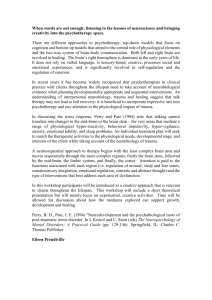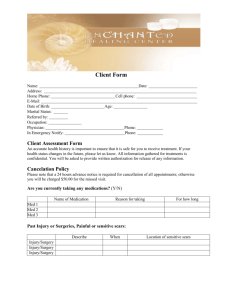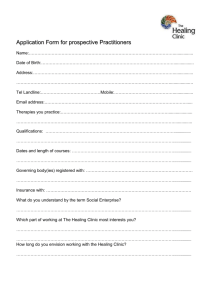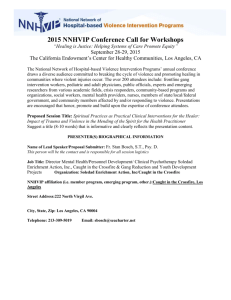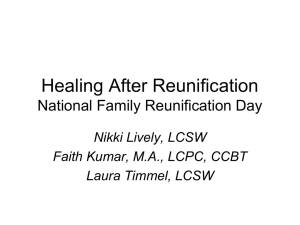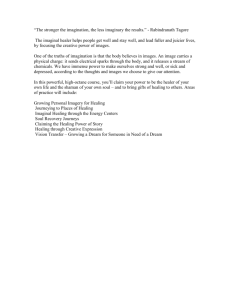1 Reflections on the Plural Ministry to Sex Offenders, Survivors and
advertisement
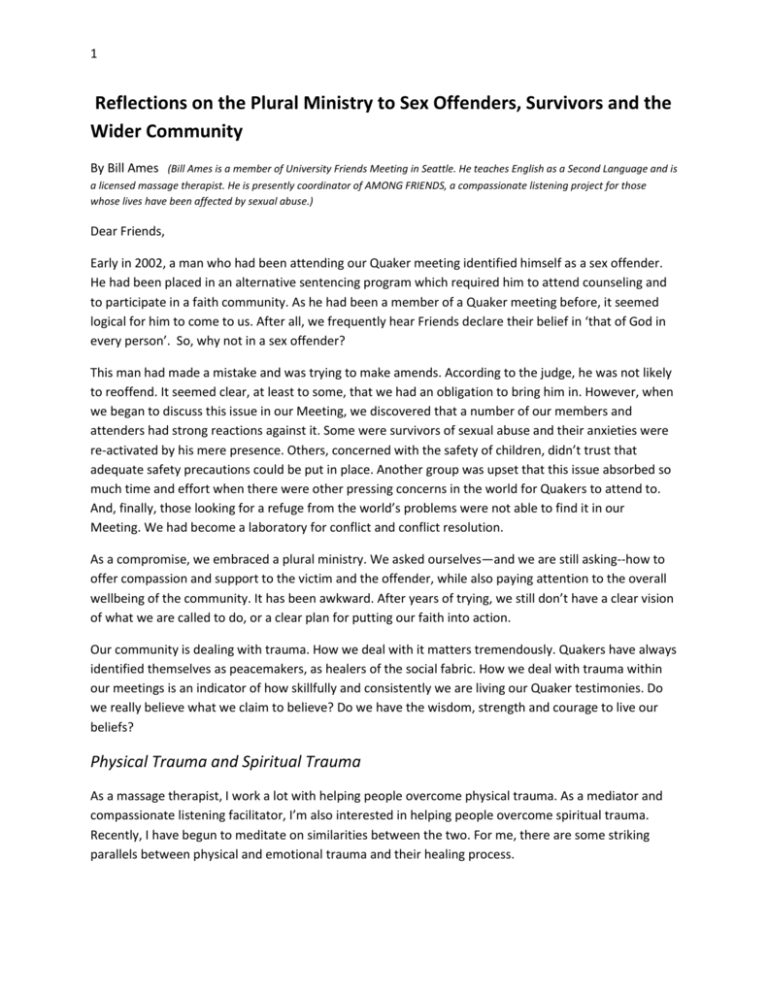
1 Reflections on the Plural Ministry to Sex Offenders, Survivors and the Wider Community By Bill Ames (Bill Ames is a member of University Friends Meeting in Seattle. He teaches English as a Second Language and is a licensed massage therapist. He is presently coordinator of AMONG FRIENDS, a compassionate listening project for those whose lives have been affected by sexual abuse.) Dear Friends, Early in 2002, a man who had been attending our Quaker meeting identified himself as a sex offender. He had been placed in an alternative sentencing program which required him to attend counseling and to participate in a faith community. As he had been a member of a Quaker meeting before, it seemed logical for him to come to us. After all, we frequently hear Friends declare their belief in ‘that of God in every person’. So, why not in a sex offender? This man had made a mistake and was trying to make amends. According to the judge, he was not likely to reoffend. It seemed clear, at least to some, that we had an obligation to bring him in. However, when we began to discuss this issue in our Meeting, we discovered that a number of our members and attenders had strong reactions against it. Some were survivors of sexual abuse and their anxieties were re-activated by his mere presence. Others, concerned with the safety of children, didn’t trust that adequate safety precautions could be put in place. Another group was upset that this issue absorbed so much time and effort when there were other pressing concerns in the world for Quakers to attend to. And, finally, those looking for a refuge from the world’s problems were not able to find it in our Meeting. We had become a laboratory for conflict and conflict resolution. As a compromise, we embraced a plural ministry. We asked ourselves—and we are still asking--how to offer compassion and support to the victim and the offender, while also paying attention to the overall wellbeing of the community. It has been awkward. After years of trying, we still don’t have a clear vision of what we are called to do, or a clear plan for putting our faith into action. Our community is dealing with trauma. How we deal with it matters tremendously. Quakers have always identified themselves as peacemakers, as healers of the social fabric. How we deal with trauma within our meetings is an indicator of how skillfully and consistently we are living our Quaker testimonies. Do we really believe what we claim to believe? Do we have the wisdom, strength and courage to live our beliefs? Physical Trauma and Spiritual Trauma As a massage therapist, I work a lot with helping people overcome physical trauma. As a mediator and compassionate listening facilitator, I’m also interested in helping people overcome spiritual trauma. Recently, I have begun to meditate on similarities between the two. For me, there are some striking parallels between physical and emotional trauma and their healing process. 2 In the body, when there is insufficient circulation in the muscle tissue to carry away the toxins, the muscles become painful and may go into spasm. Similarly, when our minds are cold and stiff, toxins such as fear, anger and resentment may build up. When there is too much toxin, it can provoke spasms of destructive behavior. Massage helps to bring circulation back into the muscle tissues, allowing them to warm up, relax and soften. The circulation carries the toxins away and the pain is relieved. Also, as the body forms scar tissue, collagen fibers get laid down in a random pattern, often causing adhesions and contractures in the skin, muscles and other connective tissues. The tissues can stick together, sometimes making it painful for the body to move in its normal way. The problem can be treated, though, if the collagen fibers are broken up by different kinds of (often painful) cross-fiber massage and then the tissues are stretched. This helps the new collagen fibers align themselves with the fiber direction of the original tissue. Massage does not always mean comfort. It may be painful to stretch out a muscle or joint that has been immobile for a long time. It may hurt when the massage therapist applies pressure to a release knot in the client’s back, or uses cross-fiber friction to break up the adhesions in their shoulder. Similarly, the work of spiritual healing may also involve pain. It almost certainly hurts when we confront our own fear and anger, when we find inconsistencies in our lives or realize we have done wrong. Nevertheless, it is worthwhile to move through the pain toward healing and reconciliation, toward freedom. Typically, a person who has been wounded spiritually will build up lines of defense around their wounds. These are the equivalent of scars, and may leave the person with spiritual hyper-sensitivities or blind spots. The person may react in a massive way—like an allergic reaction-- to something a non-wounded person would find innocuous. Or, they might fail to react in a threatening situation. In either case, their behavior is difficult for the non-wounded person to understand. Those who would like to help, especially if they are not trained in dealing with trauma, quickly find the job harder than they had imagined. They often find themselves challenged to look at their own unresolved trauma, at their own fear, anger, shame, disappointment, loneliness and sin. This is where massage and spiritual healing diverge. When massage therapists seek to provide an opportunity for healing by working to soften and stretch the tissues, it’s usually a one-way transaction. When a worshipping community seeks to soften and stretch attitudes and ideas, it’s community-wide, and may have profound impacts on the community itself as unresolved issues come to light and the community tries to deal with them. The process may be painful, but it can provide a tremendous opportunity for growth. What can the Community Do? Seek Clearness The question of whether to admit a sex offender into our community raised fundamental questions about our Quaker identity and about how we find balance between justice, safety and compassion. 3 The community needs to study its spiritual foundations for wisdom and guidance in this particular situation. It needs to go very deeply into the heart of its beliefs and aspirations in order to devise a simple, clear spiritual statement of love and respect for all. This process requires time, effort and patience, but is supremely important. In her book Trespass and Trust, Daphne Glazer provides an outline of how such a statement might look. Its key points are an affirmation that we are called by a loving God to take part in the healing of the world, that we are called to seek out that which is good in all people, for everyone has an element of the divine in them, and that we are called to take risks for our faith. Set up protocols---Be Prepared and Be Informed It’s essential for the worshipping community to think about how to create a safe environment for everyone. Victims need to know there is a system of support for them in place. Offenders need the support of clear boundaries to protect them from false accusations and to keep them from re-offending. Finally, the community at large needs to take a careful look at childcare and youth supervision arrangements. People who work with the children should be given a background check, and a system should be set up to make sure no adult is ever alone with children. The Meeting at large also needs to provide education to the community’s children and adults. Every member of the community would benefit from understanding and being alert to ‘red flag’ behaviors which may indicate abuse. If they recognize them and challenge them, they may be able to prevent sexual abuse or to stop it once it has started. Include Everyone Community is the people we talk to and those who listen to us. For a variety of reasons, some people are less able than others to express their needs and they can be drowned out in the rush to be heard. Some don’t know how to articulate what they are feeling or are as yet unaware of what they might contribute. The community needs to stimulate and encourage them. Some have been silenced. In the past or present, they have been taught that speaking is dangerous. They have a powerful need for the healing and support community can give, but they have been denied access. Our community has an obligation to seek them out, to help break down the barriers of fear and shame that may surround them, and to make sure these voices can be heard. In the way we organize dialogue, we need to create conditions where people feel safe to share their needs and feelings. We should make a commitment to listening as a community and actively invite people to share their story, telling the truth as they know it, without trying to comment on it, judge it or fix it. What Can the Individual Do? Listen from the Heart 4 Among Quakers, worship usually involves sitting in silence, clearing the mind and listening for what God might have to say to us. This is also practice for compassionate listening. Compassionate listening is a way we can help each other through listening. We invite the person to whom we would like to support to tell us their story. We listen with attention and may reflect back to the person what we have heard. We listen without judgment. We hold back from giving our own ideas, interpretations or advice. We simply try to connect with the person on the level of the heart. This sounds simple, but is actually difficult to do. Often, when we think we are listening, we are unconsciously reacting, judging, planning, daydreaming or problem solving. We frequently don’t realize when we have stopped listening. Also, whether we realize it or not, our minds and bodies are closely interconnected. Something happening in our minds will be reflected in our muscles, our hearts and in our breathing. If we fail to notice that our breathing has changed, or that the feeling in our throat, chest or stomach has changed, we may be unaware of what we are feeling. What we feel in turn, affects how we listen. Therefore, it is important to pay attention to what is happening in the body. Listen to the Heart In our own lives there may be residues of fear, pain, resentment or denial. These may cloud our judgment, making us less able to be present with others, less rational and less predictable. This unfinished business makes us less safe for others to be with. Consequently, if we wish to be useful in healing the world, we have to do some spiritual housekeeping. For centuries, Quakers have used meditation on queries as one way to help find new insights and to point up inconsistencies. Some examples might be as follows: o o o o “If I truly believe in ‘that of God in every person’, what must I do to make contact with ‘that of God’ in this person? “How might I be able to apply the dictum, “First, let us try what Love can do,” in this particular situation?” “How might I be able to show compassion for myself and for others in this situation?” “How am I contributing to the suffering of the world, and what might I be able to contribute to its healing?” Pema Chodron is an American Buddhist teacher in the Tibetan tradition. In her book Practicing Peace in Times of War (Shambala Press 2007) she describes a meditation practice called ‘compassionate abiding’. She says that when we’re faced with painful feelings, our normal impulse is to push them away or try to control them. As we struggle to control our feelings, we lay judgments and interpretations on them. They become very solid for us, and we give way to the temptation to do something about them. Instead, we might try simply to sit with one of those uncomfortable feelings, and as we breathe in, to experience the feeling as strongly as possible; and as we breathe out, to relax. We should notice what thoughts come into our minds, but let them go as we breathe out. Our thoughts and feelings about what 5 we are feeling are just that, thoughts and feelings. They aren’t enemies we have to struggle against. She says, “It’s not anything except energy that gets solidified and that we justify and then, on the basis of that justification we hurt people….Gradually we learn to simply abide with our experience just as it is, without building it up or tearing it down, without getting carried away, knowing our own unfabricated energy as the same fluid, dynamic, unpindownable energy that courses through all living beings.” (p. 83) Share From the Heart Fear and shame keep us from speaking, from asking questions or from seeking help. They keep us powerless. Overcoming them is a big part of the work of healing. As we move in the direction of overcoming fear and shame, we also acquire more personal power. Muscles require exercise in order to become strong, and so does your voice. It is important to put your experience into words, to talk about it with family and friends, to express your fear, anger, confusion and shame. By attempting to put your experience into a concrete form, you may be able to gain deeper insight into it. By seeing how others react to the expressed form of your experience, you may gain insight into how to deal with it yourself. By sharing your story, you provide your community a chance to know you, to know your needs and to give you support. Your experience and your example might mean a great deal to someone else. Your little bit of courage might encourage someone else to talk about, and gain more insight into their own experience. You are not doing this for yourself only, but for those you love and for your community. After all, our community is the people we communicate with. The more deeply we communicate with people, the deeper our relationship is likely to be. Conclusion We all suffer from the effects of unresolved trauma around us. Fear, anger and resentment affect our spiritual and interpersonal life like scar tissue affects our tissues. They restrict our movement, making us stiff, and afraid of pain. Yet we want to heal. We want to be able to move freely, without fear. We want to be able to express our needs, share our stories and tell our truth. We are not there yet. Collectively and individually, we have work to do. We must seek clearness about who we are at the deepest level and what we are called to do. We must establish safe boundaries so all are protected and, despite our fear and anger, we must work to create a community where everyone has a voice. When the worshipping community provides a safe place for spiritual communion in a structure which both comforts and challenges, even the hardest hearts can begin to soften and grow.

